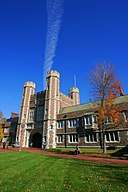Joseph Gibson Hoyt
Joseph Gibson Hoyt (January 19, 1815 – November 26, 1862) was the first chancellor and a professor of Greek at Washington University in St. Louis (then named Washington Institute in St. Louis) from 1858 to 1862. Born in Dunbarton, New Hampshire in 1815, Hoyt received his undergraduate education at Yale University, where he was a member of Skull and Bones. After Hoyt's graduation from Yale in 1840, he served as an instructor in mathematics and natural philosophy at Phillips Exeter Academy from 1840 to 1858, before taking up his post at Washington University. In 1862, Hoyt died in St. Louis, Missouri at the age of 47.
Biography
Joseph Gibson Hoyt, Washington University in St. Louis's first chancellor, was born in Dunbarton, New Hampshire, in 1815. Until he was 16, he was only able to attend school three months a year because he was needed on the family farm. Nevertheless, he entered Yale University in 1836. There, he took prizes in mathematics and classics, served as editor of Yale's famous literary magazine, and graduated sixth in a class of 100.
After graduating in 1840, he took charge of an academy in Plymouth, New Hampshire, and a year later was appointed professor of mathematics and natural philosophy at Phillips Exeter Academy in Exeter, New Hampshire, where he remained for 18 years and rose to national prominence as an educator. He was a skilled draftsman and architect, personally designing some of the buildings and furnishings in the town of Exeter.
Hoyt helped revise the New Hampshire state constitution in 1851; and in 1858, narrowly missed a congressional nomination. But that same year he accepted the appointment as chancellor and professor of Greek language and literature at Washington University in St. Louis. He arrived in St. Louis in 1859, he wrote, with a "controlling purpose" to develop a college. "Of the constituent elements of a true University," he said in his inaugural address, "the first and most important is the College, which should give students a solid foundation in the liberal arts." He did just that, defining the requirements and curriculum for bachelor's degrees, which survived into the 1890s, and designating a full-time faculty for the College. His most noted hire was that of William Chauvenet, a Yale College classmate who came as the new chair of mathematics and astronomy and would later succeed him as chancellor.
The University's Collegiate Department, the forerunner of Arts & Sciences, graduated its first class of five students near the end of his tenure in 1862, although he missed the ceremony due to illness, knowing he was dying of tuberculosis. On October 4, Hoyt tried to resign in a final, poignant letter to William Greenleaf Eliot, who had previously refused to accept his resignation: "I need not say," he wrote, "that it fills me with inexpressible sadness to feel constrained, at the very noon of life, to ask leave to lay down an office in which I had concentrated every worldly hope and ambition." He died of complications from tuberculosis on November 26, 1862.
Of his service to Washington University, one biographer wrote: "The institution which he found an academy he left a university." William Greenleaf Eliot referred to him as "a perfect educator."
Hoyt Hall, a dormitory at Phillips Exeter Academy, is named for Hoyt. A large plaque on the building reads, "In memory of Joseph Gibson Hoyt, the great teacher."
External links
- Washington University in Saint Louis
- Biographical entry at Washington University in Saint Louis
